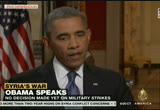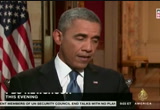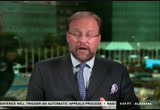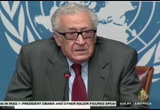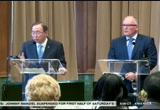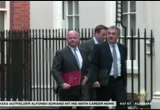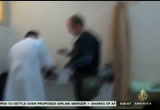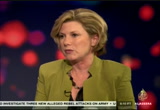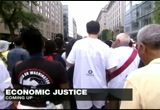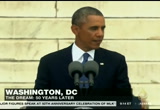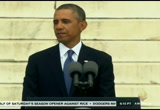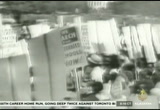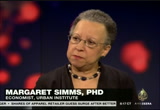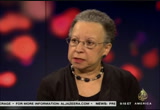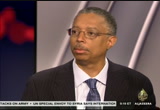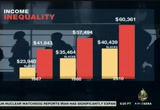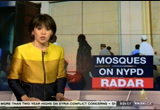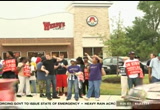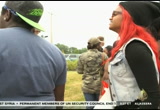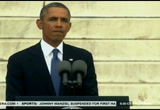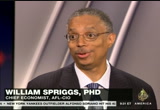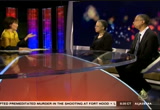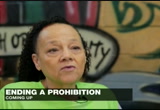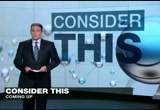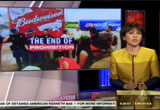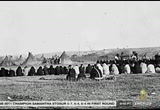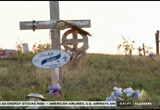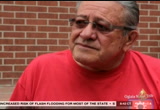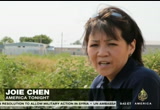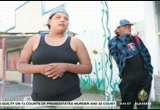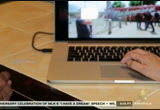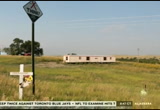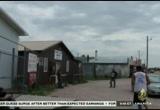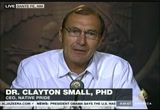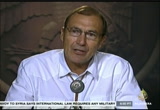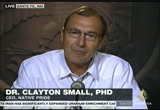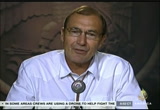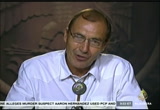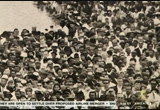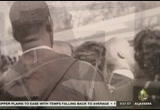tv America Tonight Al Jazeera August 28, 2013 9:00pm-10:01pm EDT
9:00 pm
>> welcome to al jazeera. i'm john siegenthaler. here are tonight's top stories. president obama this evening has said he has concluded that the government in syria carried out chemical weapons attacks against its own people. a limited tailored military strike would send a shot across the bow of the assad regime. >> first of all, i got options from our military. had extensive discussions with the national security team. if the assad regime used chemical weapons on his own people that would change some of our calculations and the reason has to do with not only international norms but also america's core self interest.
9:01 pm
>> in texas, the fort hood shooter gets the death sentence. nidal hasan, the death sentence now starts an automatic appeals process. on the 50th anniversary of martin luther king jr.'s i have a dream speech, hundreds of thousands gathered at the national mall. fire continues to go into yosemite national park. that's the news at this hour. we'll see you at 11. >> on america tonight, stepping back, faced with the unraveling of national support for the strike on syria will the u.s.
9:02 pm
president go it alone? and on the anniversary of the march for jobs and justice we consider just how much difference 50 years have made. >> dr. king would ask, to sit at the integrated lunch count if you can't -- counterif you can't afford the meal. the new fight against another vicious intruder. >> this one is a 10.5% alcohol in there. this is what they drink. and good evening, thanks for being with us. i'm joie chen. at the end of a tumultuous
9:03 pm
day, president obama says if he decides to launch a military streak against syria he may have to go it alone. hundreds of syrians fell victim to a chemical attack launched by their own government. that changed today. by this evening, though, in an interview with pbs the president had signaled his hand may have been slowed for making a quick strike against damascus. critically he says he has not made a decision yet to do it. >> although what's happened there is tragic and although i have called for assad to leave, and make sure that we've got a transitional government that could be inclusive in syria, what i've also concluded is direct military engagement involvement in a civil war in
9:04 pm
syria would not help the situation on the ground. so we've been very restrained although deployment cli we have been very active, provided humanitarian aid to those displaced by the war. >> this is the day's headline in the british dal daily mail. there were important signals in the president's comments today about what the u.s. and its allies were willing to do next. james bays has been following today's events from the united nations in new york. >> joie, as you know, the united nations security council has been divided on this, the ambassadors of the five most important countries, those that have a veto on any resolution
9:05 pm
were called in by the u.k. who's proposing this draft, the other countries, the u.s., france, russia and china, russia and china always on the other side of the argument, and that may leave the western nations with pressing ahead with the military strike without the authorization of the u.n. today speaking in geneva, speak lactar brahimi was asked about the legality of such an operation. >> i do know that this, president obama and the american administration are not known to be trigger-happy. what they will decide, i don't know. but certainly international law is very clear. security council has to be brought in. >> dr. brahimi is not the only
9:06 pm
u.n. official potentially causing problems for the u.s. interviewing witnesses and taking samples, the inspectors, no less than the u.n. secretary general ban ki-moon says they must be allowed to finish their work. >> my responsibility at this time is to conduct a thorough and complete investigation. whether there is -- chemical weapons were used or not. that's why they are working very hard on very dangerous circumstances. let them conclude their -- complete their work for four days. >> that was a call that was also echoed by the syrian ambassador to the united nations who came to speak to reporters here in new york.
9:07 pm
before you listen to his comments it's worth noting that he represents the same syrian government that one week ago when the chemical attack took place said it was fabricated. >> we are sure who did it. all we are asking for is to give time to the investigation team operating now in syria to conclude it's works to come up with a scientific report to be examined by the security councilmembers. >> joie if all of the comments we've heard from ban ki-moon and from dr. brahimi weren't causing concern in the white house, there is another matter, the resolution that david cameron has been forced to put forward in front of the parliament. could not take place for weeks.
9:08 pm
>> shee ala macvicsheila macvico decision but what? >> he was very careful. he talked about america's core national security interest. and that very strongly suggests that they don't get a u.n. resolution, they know they're not going to get a u.n. resolution. if the british support falls away because of uncertainty in parliament, president obama determines that this goes to the heart of american national security interest and is suggest he would be willing perhaps to go it alone if it came to that. >> but hang on. that seems like it would need some evidence of something. what do we expect to come forward next? >> tomorrow the u.s. administration and the u.k. government are going to publish
9:09 pm
a dose 88 of evidence. we're not sure what's in the dossier. it may contain a reference to an intercept, apparently made by israel intelligence that recorded a phone call in the aftermath of the poison gas attacks last week between a very frantic ministry of defense senior official and a commander on the ground, the ministry of defense official demanding what had just happened. now there has been briefing on tonight, to house and senate intelligence committee members. and we heard from republican representative mike rogers who is the chair of the house intelligence committee, he has described what he heard in his briefing as convincing if not compelling, given the history. the history of course is that
9:10 pm
the syrian government has been accused and at least in the past on add least 10 different occasions of using chemical weapons against the webles. >> don't you believe president obama is trying to give himself an out, a way to walk back from this? >> it is clear there are many options on the table. i don't think the options that's there is the option of doing nothing. we didn't hear that language from the president. he has not -- he has said this deserves a response, has been very successful, secretary kerry has been extremely forceful within his language. the vice president yesterday. the administration is looking across the atlantic, and prime minister cameron was faced with a mutiny within his own party, where his party members said they would not vote tomorrow for a resolution authorizing the
9:11 pm
strikes. everyone in the u.k. in europe in the united states remembers what's called the dodgy dossier. secretary of state colin powell making the u.s. intelligence case for war in iraq which was founded on the false premise of weapons of mass destruction. that's what's in people's minds. >> that's what leads to the revolution there. sheila macvicar. thank you very much. 50 years later, the business. >> too many communities across this cup in cities, rural ham lets, the shadow of poverty casts a pa pall on our youth. >> then and now. back in a moment.
9:14 pm
>> history was recreated here in washington today. tens of thousands gathered in front of the lincoln memorial, quite an act of that famous day in 1963 when martin luther king jr. claimed he had a dream. the march on washington were not simply freedom and civil rights but also good jobs and fair wages. and today, president obama picked up on those same themes.
9:15 pm
>> what does a profit of a man dr. king would ask, to sit at an integrated lunch counter if he can't afford the meal. this idea that one's liberty is linked to one's livelihood. that the pursuit of happiness requires the dignity of work, the skills to find work, decent pay, some measure of material security, this idea was not new. lincoln himself understood the declaration of independence in such terms. as a promise that, in due time, the weight should be lifted from the shoulders of all men. and that all should have an equal chance.
9:16 pm
and dr. king explained that the goals of african americans were identical to working people of all races. decent wages, fair working conditions. livable housing. full aid and security, health and welfare measures, conditions in which families can grow, have education for their children, and respect in the community. what came was describing has been the dream of every american. what's lured for centuries, new rivalarrivals to our shores. and along the second dimension of economic opportunity, the chance through honest toil to advance one's station in life
9:17 pm
for the goals of 50 years ago had fallen most short. >> the original march on washington was indeed all about jobs and equality. as the president reiterated at a, civil rights and decent wages do go hand in hand yet african americans still face disparities in income and employment. here to talk about where we have been as a nation and what lies ahead for the search of jobs and justice economist margaret simms who joins us from the urban institute. she writes the economic disparities and albert briggs from the afl-cio. back in 1963, unemployment among african americans and nonwhites the total unemployment was 5.7 per possess. over the last 50 years this trend has been steady. the percentage of unemployed
9:18 pm
african americans remains almost double. african american unemployment is much higher almost 13%. dr. simms let's start with you. is this a stark sign that these inequalities have not changed? >> i think if you look at the numbers in the aggregate inequality has not changed but there has been quite a bit of change in terms of opportunity for african americans who are fortunate enough to get an education, a good education. we have seen movement for black women for example from domestic work into more pink collar and office work. >> which contains some dangers itself. >> indeed, even though they have moved into these jobs their pay is not equal of that of white women who have entered into those jobs in greater numbers than they were in the 1960s.
9:19 pm
we have also seen movement into management positions and of course an example in the private sector just like you know president obama is our first african american president, we've had presidents of major corporations ceos who were african americans. >> we do see some change doctor but in what sense are we seeking a sort of employment equity as it were? >> we have had two problems that have hit us. the economy has changed and stop generating good jobs. we don't give good credit to the achievements made at that time. the demand was for jobs, they wanted full employment, and they actually got what they wanted. in 1968 many the unemployment rate for african americans went down to the 6% range because the economy was devoted to full employment. in fact the council of economic advisors under president kennedy
9:20 pm
in 1963 was not satisfied with the 5.7% unemployment and they pledged they were going to move the economy back to 4% unemployment. so part of it is we had a national dialogue that talked about good jobs and talked about full employment and in the 1980s we disengaged from full employment. we went to national policies that were far more concerned with inflation. and as a result we don't generate good jobs as we did. so in 1963 only 4% of african americans had a college degree. today it's 20%. and yet when you look at income it's about the same in real terms as it was in 1973 at the end of some tremendous evidences because of the march. >> when you think how balance out and how much change actually has to take place before you lift these averages to some parity, looking at it there was a report we looked at today that
9:21 pm
said if the trend continues it would take poor people of color 307 years to catch up. that's sort of hard to comprehend. >> i think you look at it in fits and starts. in 1963, the median earnings for black men put them below poverty. so over half the black men in america couldn't lift out of poverty but because of policy changes that took place including the civil rights act which stopped explicit forms of discrimination in 1963 the postwas still running adds, help wanted colored, help wanted, white. that ended, to black men into public sector jobs. the result was black level for black children plummeted. so real things did happen in that amount of time.
9:22 pm
>> ream things did change. i wanted to look at another figure. the income of african american families has remained lower, as you go through the decades still this $20,000 gap. in earnings. and this seems like the sort of thing that becomes hard to clear. >> well, you know you have to look at what's driving numbers. and a large part of it is earnings. because earnings is the biggest contribution to income. so if you're look at household income there are a couple of things that you need to be looking at. one is how many people are working in the household and what they are earning. and there we see that african americans, you know the typical household just isn't able to keep up. in part it's job opportunities and another has changes in the family composition. in terms of having the ability to have more than one worker. >> to have more income coming
9:23 pm
into the household. we're going to ask you to stand by both of you because we're going to continue to talk about equity, pay and what households can do to lift their own incomes. we'll look for your insight. we'll talk about the present day fight to raise the minimum wage. when we return we'll hear from fast food workers as they gear up for a fair fight. >> everyone's out here representing a purpose, to take care of our family, take care of our children and to get 7.35 raise up to 12.35 or 15.
9:25 pm
>> and now a snapshot of stories making headlines in america tonight. a ums decision, for nidal hasan. fort hood shooting rampage in which he killed 13 people and injured 42 more. the press department has secretly labeled mosques, as terror organizations. reports, police are investigating imams without
9:26 pm
evidence. the national unemployment rate also down to 7.7%. those these latest figures do seem promising for many people it is still very tough to find a good-paying job. the fast food industry is burgeoning with thousands of workers are making a meager living at best. it is expected to be the largest strike by fast food workers. this movement started with smaller protests last fall. america tonight's sheila macvicar meets protestors. >> after months of slowly spreading descrieks targeting the fast -- strikes targeting the fast food industry, workers say they will work off the job again tomorrow. for the first time the strike is spreading to the american south and west.
9:27 pm
they think it's kids flipping burgers for pocket money and why would they need a union, think again. the you know, government says fast food workers are overwhelmingly female. 66%. with an average age of 32. they make up a large part of the one-third of americans who earn less than $24,000 a year. in st. louis, the city council has passed a minimum wage law. pay more than $15 an hour without health insurance. that the city hall says is living wage here but it only applies to contractors doing business with the city. fast food workers like la wanda and cinnamon earn $7.35 an hour. they joined the strike in july.
9:28 pm
>> everyone is out here representing a purpose to take care of our family, take care of our children and to get 7.35 raise up to 12.35 or 15 you know, to make a better life for us. >> you ready to come on back? >> la wanda is 28. she lives with three of her four children, her sister natasha and her nephew. it's paycheck to paycheck. >> by the time we get paid, our paychecks are already spent. we are working to pay bills and do odds and ends for the kids what we are able to afford. >> singleterry gets some help with the rent. hardest to her, she has had to let her daughter go to texas with her mother. >> i cry myself to sleep, i'll start crying now. it's very, very hard not having her here.
9:29 pm
she doesn't get to play with her brothers and sisters like she needs to be. i'm sorry. >> singleterry says she will be on strike again tomorrow. she can't afford to lose the paycheck but she says something has to change. >> a lot of people have not stood up yet. this is you know just now starting and we're still trying to get people to stand up and believe in you know what's going to happen. we don't have a lot of people yet but we're still trying to get that. >> as we commemorate the 50th anniversary of dr. king's i have a dream speech the dream of a better future for a lot of low wage workers remains just that a dream. the just completed survey, shows
9:30 pm
that these same jobs trap them in a cycle with little hope for economic viability. an issue the president himself addressed today. >> for over a decade, workers have seen their incomes stagnate even as the corporate pay explodes, and inequality has steadily risen over the decades. upward mobility has become harder. and too many communities across this country, in cities and suburbs and rural ham lets, the shadow of poverty casts a pall over our lives, dmshed prospects, inadequate health care and perennial violence. >> we want to welcome back now dr. margaret simms and dr. william sprigs, economists,
9:31 pm
and folks equality of wages within this country, i want to take you back to 1963 again and when we talk about jobs and justice being really keys to the march on washington, the minimum wage back at that time was $1.25. which is sort of hard to comprehend. adjusted to today's rate of inflation that would equal about $9.54. today's minimum wage is $7.25, that is $2.29 less than in 1963. dr. spriggs what does it really mean when these low wage workers say, we're fast food workers, we need a minimum wage of $15 an hour. put that in perspective. >> the marchers on washington wanted it to become $2. what the workers demand at this time close to what they demand
9:32 pm
he at that time. the president talked about inequality going up but inequality is going up because american workers are making a lot more than they used to, they are just not taking home what they used to. and it's the gap between what they produce and what they take home that's driving the inequality. that's going to a bigger share of national income going to profit. a bigger share going to interest payments. a smaller share going to wages. and as the wage pie shrinks then of course inequality between workers is going to increase because more workers are fighting over a smaller and smaller share. the big difference, unions. in 1963 a much higher share of the private workforce was unionized and many employers felt they had to compete with wages to meet those workers and that meant that swaidges and productivity -- wages and productivity went together. we have broken that link, we
9:33 pm
have gotten our rate of unionsation down and that rate doesn't translate to the workers as well. >> you do work for the afl-cio a big union organization and there is great discussion about unionizing among these workers. dr. simms, what does it mean to be a minimum wage earning family and how does a family function and live on that kind of money? >> it's very difficult to live off of $7.25 an hour. if you work full time year round on that, you could just about and not quite lift yourself out of poverty. not if you had children or a spouse. that wouldn't be possible. >> so we go back to talking about these women who have become heads of households increasingly and yet the maximum they can earn is this $7.25. >> it is not just women but principally women because they
9:34 pm
tend to be in many of these service jobs that pay very low. but it could be men as well. in either case, they can't really support a family. what we think about when we talk about low wage workers or low income families, in order to get out of that low income area you need about twice the poverty level for a family of four that would be about $44,000. and that would mean two people working at $11 an hour or one person earning about $22 an hour. >> quite a bit of difference from where we are at now. but i have to say on behalf of small businesses who will increasingly step up and say look we understand people need more money want more money but we too as small businesses have a lot of pressure on us. put in perspective how this is going to help them. is there a way that businesses can look to these kinds of increases in minimum wage being helpful to them? >> it helps them in many ways.
9:35 pm
first it reduces their turnover. workers who get better wages are looking for better jobs. they have to remember it's not just their own company that's going to raise the wage, all companies would raise the wage. so it isn't i'm going to be put at the competitive disadvantage if the rates go up, all rates go up. who buys a lot of goods from a lot of these small companies? those same workers. when their wages go up their customers incomes go up. this helps them too. it is more from the perspective much what if i did it but if we all did it. that helps small businesses as well. >> the political reality going to where we are, 7.25, to 12.50 that's a particularity large nut
9:36 pm
to swallow. >> it is. and the work supports that enable people to be able to work at the lower wages and still be able to provide for their families in some ways so subsidized child support for example is very important. quality childcare is something that we need north to bring the next generation along. so we have many ways in which we could sort of bridge some of the gaps but they are all political in some ways. >> certainly are. economist dr. margaret simms and dr. william sprigs, when we return here, alcoholism running rampant on a reservation. how -- >> the father. i've had to report them to social services so i know. >> how a vote to end prohibition has divided a community grounded by family.
9:38 pm
>> coming up on consider this, how can the u.s. build a coalition of the u.s. against syria if the americans can't unite behind intervention? how vulnerable are we to a more serious even devastating cyberattack. mrs. 50 years after the march on washington how far america has come on equality. america through the lens of a
9:39 pm
photographer. we'll see you at the top of the hour. >> tonight we look to a place that so often falls out of view that even when outsiders aren't looking, life on many native american indian reservations are hard and isolated and challenged by a poverty that's hard to comprehend. and also in many places by companion scourge, which makes companionship almost impossible. alcoholism. that is what makes the result of a recent tribal referendum all the more surprising. the tribe voted to end a prohibition on alcohol sales. now it's skirting for what could
9:40 pm
be an economic windfall or an invitation to even greater level of devastation. it is harnlg to imagine a place at the same time more breathtakingly beautiful and as heartbreakingly sad as the land of the oglala lakota, the pine ridge reservation home of the bad lands and for more than a pained and bitter century what outsiders call the oglalla sioux nation. a nation of chief sitting bull who led the victory over custer at little big horn and the massacre of the u.s. cavalry at wounded knee. for generations now, the children of this warrior nation have been cut down by a different foe: alcohol. 22-year-old clarence roland was born and raised on the res and
9:41 pm
knows what alcohol and addiction do to a family. >> clarence, tell me where we are. >> we are at the grave of one of my aunties, her name is emily joyce roland. >> tell me about her. >> emily was young, 21 years old. she died from the effects of alcoholism. >> at 21? >> at 21. >> how long had she been drinking? >> since about 14, maybe younger. >> emily's sister ashley lies behind her. just 14 she was drunk, walking in the dark when a car driven by other drunken teens struck her. clarence's grandfather is here too. cirrhosis of the liver. his mother jinola was just 31, prescription drugs. at 17 clarence left school to raise his brother and two sisters. >> what kept you getting addicted to alcohol?
9:42 pm
>> losing my family members. >> one by one? >> finally it opened up my eyes to where i needed to sober up because i was a heavy drinker. >> my mom she was really loving, funny fashion-d passionate. she laughed a lot and really good sense of human, she loved us kids. >> this is one of clarence's only pictures of his mother. he's in the back, with the smile on his face. but on the res even the happiest families are broken by alcohol. tribal president brian brewer. >> so tell me what has alcohol done to your community? >> the alcohol has destroyed our communities, our nation. >> of the 45,000 people in your tribe, how many are directly affected by alcohol? >> i would say probably -- well i'd say 100% affected by it. those that are addicted to it show that it's over 50%.
9:43 pm
>> over 50% are addicted? >> 50, 55% are addicted. >> and everybody else feels it in some way? >> in my family, i went to very few funerals where they died in natural causes. they died in car accidents, cirrhosis, fights, shootings. >> all connected to alcohol? >> all connected to alcohol. >> what's most surprising is the tribe has tried to stop the booze. this is a dry reservation, no liquor stores on the res. possession of alcohol is illegal. where does it come from? almost all of it from just outside of the reservation, across the border. >> over on that side is oglala lakota country, governed by the tribal laws, tribal traditions. take a few steps over the border and you're in nebraska, governed
9:44 pm
by a different set of laws and a different morality. welcome to unincorporated white clay nebraska. not listed in u.s. census data but the population is said to be just 14. but on the strip that passes for a town, there are four liquor stores which sell more than 4 million cans of beer, malt liquor, juice they call it, a year. almost all of it to people from the res or who now just sleep and wait on the street. >> my die died because of alcohol. my friends little brother hung hisself because of alcohol and i watched a dude got shot because of alcohol. so i mean i lived it all. and that's how my life is. >> state of nebraska has no respect for our laws. no respect at all for our laws. that's how they look at us. we're just money, money in their
9:45 pm
pockets and meth is legal in nebraska. if i took a meth truck across that line, everyone went across and they went back, i'm sure nebraska would have something to say about that. same thing. >> you're not going in today, every other day but not today. >> and so tribal president joined protestors this summer trying to block the trucks from making their deliveries. a camp called zero tolerance sprung up just across the border calling attention oliquor sales and the reservatio reservation'. hosting on a facebook page they called oyate media network, oyate means people in lakota. >> who is this?
9:46 pm
>> she is my grandmother cheryl. box caited in this video. -- intoxicated in this video. this is what we do, a lot of our youth come together and people want to stop the bad things going on in our reservation. >> it is the young people like the ones who joined us in clarence's kitchen who seem most active in the fight and the most vocal in white clay. in a vote that might very well change life on pine ridge the tribal council just held a reverenda referenda on the res. the vote caused a deep division in the community. yvonne tiny dacory works for the
9:47 pm
health pharmacist. she's in favor of the tribe getting the money from alcohol sales even though she's seen firsthand what alcohol can do. >> i've seen the devastation. i mean i have. i've lived it. you know. i've gone into homes where i've had to take the babies out you know. i've had to call the cops on the father. i've had to report them to social services. i've done all that. so i know. know, i know. >> when we stopped to photograph a sign opposing alcohol we met the man who painted it, greg yellow horse. turns out he lives here and makes memorial crosses for a living. cross makers are busy on pine ridge. the average life expectancy here is 48 for men, 52 for women. greg yellow horse made his own brother's cross after the brother passed out drunk in winter and froze to death.
9:48 pm
the re referendum on alcohol pad by a slim margin and is being challenged in court. >> i don't think we should fight fire with fire. the fire water with the fire water. >> tribal president brewer says he will uphold the law if it comes to that. >> i'm sad about it. i really am. i hated to see it happen. >> you almost look like you would cry over it. >> i would, i have. i think it's wrong. >> it's sad here on these streets. >> clarence knows the streets. he started buying booze from the stores here when he was just 14. >> this one's a 10.5% alcohol in there. this is what they drink. i know it's not just my family who is inflicted with alcohol. it's everybody's family on the reservation. >> now clarence roland is trying to help lead his own generation away from this broken path.
9:49 pm
alcoholism so common and painful in so many native communities. indeed the indian health services says that the rate of alcoholism among native americans is six times the u.s. average. dr. clayton small who is the ceo of native pride, an organization dedicated to providing leadership healing and wellness for native peoples joins us from santa fe, new mexico. talk about the situation that fine ridge experiences in the reservations of other communities who have gone from dry to wet and started to sell alcohol on their reservations. >> well, the referendum vote was a very good foundation and by doing that, the leadership with the ogalalla sioux tribe asked for feedback from the community, what do you want?
9:50 pm
and by that referendum, although it is my understanding only 400 people voted, the vote was to open up liquor sales on the reservation. >> but the experience of other -- i think that's a very good -- >> the experience of other reservations does it tend to be positive when it goes to selling alcohol? >> two-thirds of our reservations currently have liquor sales on the reservations. and what the research shows is that for three to five years, once the liquor sales are opened up on reservations, there's a huge spike in alcohol related deaths. which include liver disease, traffic accidents, homicide, suicide and accidents. so what needs to happen and what has occurred at pine ridge is that the leadership took one to two years to prepare for this huge spike, and escalation of alcohol-related deaths.
9:51 pm
and that's really important that you just -- you have to -- you have to have a plan. you have to organize. and this includes making sure your law enforcement officials have proper training, your ems, detox, treatment and prevention programs. these things have to be in place before you open up the sales. >> well, i hear actually, as i was at pine ridge i hear a lot of indecision still about whether things are really, truly as prepared as you might think for this next step for them. indeed though can we just talk for a moment about alcoholism more broadly in the native communities? why do you think it is that there is so much alcoholism in so many places? >> well, alcohol was introduced to the american indian first nation people in canada with the european colonists. they used it to steal fir and
9:52 pm
scins from the native people and they made it available, to the point where it created binge drink i which is carried on from that time period to now. >> today the question has to do with the situation environment unemployment poverty within the reservation communities. >> well, the alcoholism rates today and other risk factors such as violence and suicide, among native people, is really a direct result of the impact of colonization, so if you want to address alcoholism and other factors you have to talk about colonization. >> but also the poverty and unemployment that exists today. we are talking about 80% unemployment in reservation communities. >> those are -- those again are directly related to the impact of colonization. yes there is -- unemployment is 80% or more. and poverty is there, and the conditions of very stark.
9:53 pm
and so half of the population on reservations have moved to urban areas for employment and for education. but even though they don't live there, they are tied to their home land, to the culture and to the ceremonies. so native people go back and forth residing in urban areas and returning to the reservation. that's their anchor, that's -- right. >> right, the cultural ties make it very hard to give up that way of life. >> joie, the audience and the american public and other countries as well, need to understand the impact of colonization, where indigenous people are invaded their way of life is taken away, policies are put in place that control. >> i understand sir but i'm afraid we're going to have to leave this discussion at this point. we appreciate though your insight, ceo clayton small. back with more of america
9:56 pm
recreated history on the national mall today 50 years later. it really was a day like no other. that has inspired curators to a new collection of photographs. we give you a look. >> the library of congress has photographs, 40 have been chosen to commemorate the march on washington. >> my mouth dropped open. these are views you don't see anywhere. >> many of these images have never been seen before, capturing the mood and experiences of every day people in the crowd. >> it gives you the idea that it was a jampacked day. it was people wall to wall, and that is the feeling that we wanted to give you in this exhibit, is that no matter where you turned, you'd see faces, you'd see people. >> the exhibit is called a day like no other. >> this isn't your normal civil
9:57 pm
rights demonstration where did you see the hoses and the people are rioting and that kind of thing. that is peaceful. this was we have a purpose, we've come with that purpose, we will leave with that purpose, and so this photo just sings to me. it sort of does that. >> some of these take you behind the scenes, like workers in new york making 80,000 lunches driven to d.c. on a refrigerated truck. these pictures were taken by columbus ohio photographer roosevelt carter, the negatives just discovered five years ago. >> what captured my attention about this particular image is these are young students, they're all dressed in their naacp jackets, and just getting off a bus. they're excited, they're together, they're organized and ready to do something. >> this is the curator's
9:58 pm
favorite. his wife donated this wall of prints. >> you're standing a crowd of 250,000 people, but when you turn around and you see this couple, and you say, you know, it just makes your heart feel good. i think that's what this exhibit does that others don't do. >> that report from america tonight's looking from those images between then and now. that's it for us. please remember if you would like to comment on any stories you've seen here tonight, just log on to aljazeera.com where you can get previews of stories we're working on. join the conversation with us on twitter or at our facebook page. we'll have a lot more of america tonight including a special report from new orleans coming up you. you'll see more of america tonight tomorrow.
10:00 pm
>> welcome to aljazeera. i'm john siegenthaler. here are tonight's top stairs pop president obama said this evening he's concluded that the government in syria carried out chemical attacks against its own people and the president said a limited tailored military strike would send a shot across the bow of the assad regime. >> i have not made a decision. i have got options from our military, had extensive discussions with my national security team. if the assad regime used chemical weapons on his own people, that that would change some of our calculations, and the reason has to do with not only international norms, but also america's
109 Views
Uploaded by TV Archive on

 Live Music Archive
Live Music Archive Librivox Free Audio
Librivox Free Audio Metropolitan Museum
Metropolitan Museum Cleveland Museum of Art
Cleveland Museum of Art Internet Arcade
Internet Arcade Console Living Room
Console Living Room Books to Borrow
Books to Borrow Open Library
Open Library TV News
TV News Understanding 9/11
Understanding 9/11
